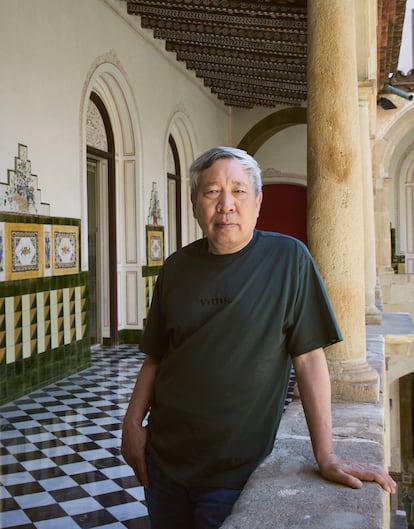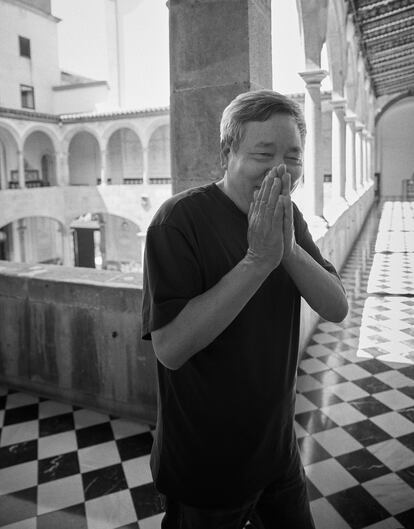Yan Lianke, writer: ‘Revolutions are terrible. Human progress cannot depend on destruction’
He began writing propaganda for the Chinese Army and, after reading the classics, became a fearless author. Perhaps that’s why he’s widely read outside his country, but hardly in China. A candidate for the Nobel Prize, his works have been translated into 20 languages

Exploring the emptiness of soldiers in the Chinese Revolution and the cost of China’s supposed progress has earned Yan Lianke, 66, the nickname “the fearless Chinese writer.” His books include Dream of Ding Village — which delves into humanity’s insatiable greed, Hard Like Water — a satire on the revolution, and Lenin’s Kisses — about the downfall of a village in the face of promises of a glorious future. He has won international awards such as the Franz Kafka Prize, been shortlisted twice for the Man Booker International Prize and is repeatedly mentioned as a potential candidate for the Nobel Prize in Literature.
Question. In the epilogue of Dream of Ding Village, you apologize to the readers for causing them pain.
Answer. In China, people were experiencing the happiness of development. Many people were unaware that others were suffering from the AIDS epidemic, which is what the book portrays. Chinese literature has long focused on the positive aspects, it has been like a hymn to the beauty of society.
Q. Why is it important to feel pain?
A. There was very little literature that paid attention to the problems we were facing. Those realities were hidden. That’s why Chinese readers found Dream of Ding Village so incredible. I wrote an epilogue apologizing for interrupting their happiness.
Q. Would you describe the literature of Chinese Nobel laureates like Gao Xingjian or Mo Yan as escapist?
A. Mo Yan writes beautifully. And we must understand that his situation in China is complex. Not all writers can be expected to address reality so directly.
Q. What prompted you to do it?
A. I push myself to do my best to tell the truth. I believe that if you can’t tell the truth, at the very least, you shouldn’t tell lies.
Q. Have you paid a price for telling the truth?
A. Being a controversial writer has consequences: not being able to publish in China. Many people think I’m not a good person. The internet is full of insults against me. I take solace in the fact that I do what I think I should do and that I can live in Beijing. In China, there are many writers who have given up some of their independence in order to earn a living.
Q. Did you do this early in your career?
A. When I started writing, my goal was to fill my stomach. To be able to eat. And also to escape the countryside.
Q. Today you write about fear.
A. In China, the entire society lives shrouded in fear and anxiety.
Q. “Everyone in China was afraid: the poor were afraid of uncertainty, and the rich were afraid of losing comfort because they knew their money didn’t come from hard work.”
A. Those who have money fear losing it. And those who don’t are worried about their children’s future. There’s also a fear shared by rich and poor alike: the fear of pesticides, the fear of the air we breathe.
Q. Are pollution and unsustainability particularly worrying in China?
A. We’re concerned about food safety. We read about food poisoning in the newspapers. Every year on March 15, there is a progam to combat counterfeit products on television. Most counterfeiting occurs in food products. Pesticides have been found in liquor, meat, and so on.
Q. You question how far a person will go for money.
A. In the 1990s, development in China was so rampant that it led people to do anything for money. In Dream of Ding Village, they sell blood, the village’s trees, and finally, weddings for dead children. My own brother and others would go out in the morning with a tractor and come back loaded with logs. In China, a lot of importance has always been placed on planting trees, and they... well... they wiped them all out. People stole power lines, they stole manhole covers. Economic development unleashed greed.
Q. Are the events in your novels based on real stories?
A. Everything is real.
Q. Are weddings organized for dead children?
A. There are people who pay for this service, especially in rural areas. It’s cultural. It’s about repairing in another life what couldn’t be done in this one.

Q. What causes more pain: the pursuit of financial gain, family...?
A. What worries me the most is the possibility of losing hope. Problems have arisen during China’s nearly 40 years of reform and opening-up. But throughout it all, people held on to hope, a sense of trust in life. I think that’s waning today.
Q. Why?
A. In China, 10 million university graduates are fearing for their future every year. The labor market is collapsing. The official statistics office used to publish unemployment figures every year. At the beginning of 2024, it announced it would no longer do so. This lack of information is worrying people. The Chinese economy has been severely affected by the three years of the pandemic. People are also concerned about the almost daily statements that the Ministry of Foreign Affairs makes regarding Taiwan. We are worried about a conflict.
Q. What are they worried about?
A. That China could be isolated in the world. I think the stupidest thing the planet could do would be to make China into an enemy country. Our economic power has been vastly overestimated, and with it, the idea that China could be a threat to the world. I would like Europe to understand that China is a country of 1.4 billion people; it represents one-sixth of humanity. Any decision taken could have very harsh consequences for all those people.
Q. What is Hard Like Water about, the Chinese Revolution or the love of the main characters?
A. In China, there’s a saying: water drops, stone is bored through. That’s the idea of the novel: love — which may seem like a small thing — can penetrate the revolution.
Q. Hard Like Water ridicules the Chinese Revolution. The protagonists sing hymns while having sex.
A. The novel sought to deconstruct a model of socialist novel that we call novels of love and revolution.
Q. Curiously, Hard Like Water — a satire about the revolution — did make it past the censors.
A. Yes, it wasn’t censored like some of my other books, but it was banned from being promoted. And now that it’s out of print, it can’t be reprinted. Actually, Dream of Ding Village was also published in China, but it was pulled from bookstores after three days.
Q. Like almost all men of your generation, you spent a long time in the army.
A. I wrote speeches for senior officials in the propaganda department.
Q. What led you to go from working for a corrupt government to describing the revolution as ridiculous?
A. The novels I wrote at first were about romanticism and revolutionary heroism. They were what I knew, what I’d read. I wrote them for pleasure. And because I didn’t know any better.
Q. How did that change?
A. During the Sino-Vietnamese War in 1979, I realized that the soldiers’ attitude toward war wasn’t what the novels I’d read and written described. The characters in the novels are dedicated to the homeland and the revolution. In real life, people fear war. What they long for is peace.
Q. The protagonist of Hard Like Water wonders if the revolution has been in vain. What do you think?
A. The Chinese Revolution is a long and complex subject. All revolutions are terrible. I want to believe that humanity has other ways of progressing. Human progress cannot depend on destruction. The last 100 years of Chinese history have been 100 years of revolution.
Q. And destruction?
A. Yes. I question the need to destroy the old in order to build the new. None of these revolutions has brought progress to China, where history seems to go around in circles without advancing. What deserves the most admiration are the last nearly 40 years of openness and development. This has allowed us to overcome the revolution and reach out to the rest of the world.
Q. You are also critical of the unchecked capitalism that has come with China’s reconnection to the world.
A. As a writer, one must be vigilant. I admire the opening and reform process in China. But I find the blind, unrestrained development taking place and its effects on the environment and people’s lives objectionable.
Q. Is it still forbidden in China to have more than one child?
A. No. Today you can have up to three.
Q. Describe the close relationship between revolution and corruption.
A. The goal of revolution isn’t to do things right, it’s to seize power. They don’t seek to improve society; they seek to profit. This self-serving attitude prevails among Chinese officials. It’s the reason why China, a country that fights corruption, continues to be mired in scandals: those who come to power think primarily of themselves. In revolution, you either win or you are defeated. If you give your enemy a break, he’ll gather his strength and strike back at you.
Q. Can the belief that things can change move the masses?
A. I believe the masses move blindly. To a large extent, they are driven by self-interest. They don’t have ideals.
Q. In some of your novels, you predict what is happening with social media, where fake testimonies are made up.
A. It happens all over the world. And it’s nothing new. In Spain, it happened during the Civil War. During the Chinese Cultural Revolution, denunciations by acquaintances were very common.
Q. What makes us easy to manipulate?
A. Fear. And this darkest part of our humanity can also make us manipulators. During World War II, many people were driven by fear. The Chinese Revolution repeated that pattern.
Q. Carl Sagan wrote: “If we’ve been bamboozled long enough, we tend to reject any evidence of the bamboozle.”
A. I agree. In China, we’ve been encouraged to forget many things, and now, when we tell our children about them, they don’t believe it. Between 10 and 20 million people died in three years of famine. We don’t even know the figures. Young people can’t believe that. Nor do they believe that, in order to speak, we had to memorize quotes from Mao.
Q. You write about this in Hard Like Water.
A. The fact that Mao’s wife wrote propaganda operas seems like a satire. Today it’s seen as exaggerated, but it was the truth. We would open any conversation with a couple of quotes from Mao Zedong. For us, it was normal. It happened even in small, remote villages. At New Year’s, it’s customary to visit family and friends to wish them a happy New Year. I remember that when we were about to leave home to make these visits, we were reminded of the phrases we were supposed to quote. It was supposedly out of admiration. The uneducated peasants, who couldn’t read or write, simply obeyed.
Q. “No medicine could save us.” Have you ever experienced a love like that?
A. Not so blinding. All writers write about what they don’t have in their lives.

Q. Many write about what they have experienced.
A. Both cases can happen, yes.
Q. Does love give us courage?
A. It gives strength and meaning. That strength is in my novels. Love can exist between a dog and its owner. But as I said, I write about things I don’t have.
Q. You don’t have a dog?
A. Yes, I have. I’ve had it for over 40 years.
Q. It shows. The loyalty of dogs and the wisdom of the elders are constants in your books.
A. I am a child of the countryside. In rural China, the elderly are symbols of wisdom, thanks to all they’ve been through. And the experiences they share.
Q. Are there no bad old people?
A. Of course. But it’s not something I’m interested in writing about. I can write about bad young people, but not about bad old people.
Q. It leaves little room for hope.
A. Hope is very powerful. But it doesn’t last long. It’s true, I have books with very little hope. They coincide with the times when I’ve been at my worst.
Q. What happened?
A. When I was 31, I had a serious back problem. I cried in pain. I wrote the book The Years, Months, Days lying in bed. Writing has helped me confront my fears.
Q. What allows a person to endure? To accept limits? To expect nothing?
A. Being honest.
Q. What is a good life to you?
A. Finding a quiet place where you can read and write away from the noise of the world.
Q. A universal classic.
A. Yes. The noise of the world draws us in and repels us equally. If I returned to my town, life would be complicated. Everyone knows me there. And everyone would ask me for help with everything.
Q. In Beijing, do you live in an apartment?
A. Yes. With my wife. She was a telephone operator and retired.
Q. You teach writing at the Renmin University of China. What do you think of young people today?
A. Many people today don’t want to get married or have children. I think if I were young, I wouldn’t get married or have children either. Life is full of pressures that we should try to avoid.
Q. You always talk about relationships between men and women. Is homosexuality persecuted?
A. For many people, it’s still taboo. Even so, these topics are talked about more today, especially in big cities.
Q. What was your childhood home like?
A. It was made of adobe. It has already been destroyed.
Q. Did your parents ever read any of your books?
A. My father died a long time ago. And my mother was illiterate.
[Yan Lianke stops. His interpreter, Belén Cuadra Mora, murmurs that the writer’s mother recently died. I realize that Lianke is crying very quietly because the interpreter herself is teary-eyed in an exercise of symbiosis that’s difficult to describe. “I know he’s been through a very bad time. And it makes me very sad.”]
Q. What did you learn from your mother?
A. How to live. She handled difficulties without drama. When I joined the army and was able to send money home, she told me it wasn’t necessary. That she lived very well. Of course, it saddened her that I had written books she couldn’t read. It saddened us both. When I returned from trips, she always wanted to see photos of where I’d been. She wanted to know what places she’d never go to were like. When she was 80, I took her to Hong Kong. She loved it. I wanted to take her to Taiwan, but she was already having so many health problems. It wasn’t to be.
Sign up for our weekly newsletter to get more English-language news coverage from EL PAÍS USA Edition
Tu suscripción se está usando en otro dispositivo
¿Quieres añadir otro usuario a tu suscripción?
Si continúas leyendo en este dispositivo, no se podrá leer en el otro.
FlechaTu suscripción se está usando en otro dispositivo y solo puedes acceder a EL PAÍS desde un dispositivo a la vez.
Si quieres compartir tu cuenta, cambia tu suscripción a la modalidad Premium, así podrás añadir otro usuario. Cada uno accederá con su propia cuenta de email, lo que os permitirá personalizar vuestra experiencia en EL PAÍS.
¿Tienes una suscripción de empresa? Accede aquí para contratar más cuentas.
En el caso de no saber quién está usando tu cuenta, te recomendamos cambiar tu contraseña aquí.
Si decides continuar compartiendo tu cuenta, este mensaje se mostrará en tu dispositivo y en el de la otra persona que está usando tu cuenta de forma indefinida, afectando a tu experiencia de lectura. Puedes consultar aquí los términos y condiciones de la suscripción digital.









































